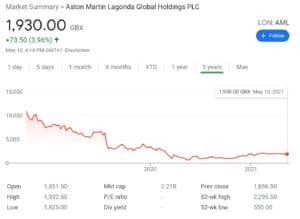How to Buy Aston Martin Shares Online in the UK
Aston Martin is a hallmark British car manufacturer that was launched way back in 1913. With that being said, the firm only went public in 2018, with its much-anticipated IPO valuing the firm at £4.3 billion.
In this article, we show you how you can buy Aston Martin shares online in the UK.
In order to buy Aston Martin shares, you will need to find a UK stock broker that meets your needs. Not only do you need to ensure that it gives you access to the London Stock Exchange – but you also need to look at fees, commissions, regulation, and payments. With hundreds of potential platforms meeting this criterion, finding a suitable broker can be time-consuming. With this in mind, below we list a small selection of UK stock brokers that allow you to buy Aston Martin shares in a safe and cost-effective manner. As such, you can diversify across heaps of other companies at the click of a button. Its fees are still very competitive. This starts at just £3 per trade if you place 3 or more orders in a 30-day period. If not, you will pay an entry-level commission of £8 per trade. On top of equities, IG also covers ETFs, investment trusts, and mutual funds. Additionally, IG is very strong in the short-term trading department. This is because you can buy and sell thousands of financial instruments from virtually every asset class imaginable. Unless you are trading stock CFDs, there are no commissions to pay. The trading platform also covers MT4, which is great for advanced analysis and automated systems. In terms of getting started, IG requires a minimum deposit of £250. You can add funds with your debit/credit card or UK bank account, albeit, e-wallets are no longer supported. While debit cards and bank transfers are fee-free, credit card deposits are charged at 0.5% or 1% when using Mastercard/Visa, respectively. Finally, IG is a heavily regulated broker. Not only does it hold several brokerages licenses (including the FCA), but its parent company is listed on the London Stock Exchange. Pros: Cons:
Although Aston Martin has been producing highly sought-after luxury cars for over a century, this isn’t to say that its shares resemble a viable investment. On the contrary, you need to perform some homework on the credentials of Aston Martin before making a purchase. In doing so, you can be 100% sure that the shares are right for your long-term investing goals. As we briefly noted earlier, Aston Martin was one of the shock IPOs of recent years. This is because although the firm has been making cars since 1913 – it only went through the floatation process in 2018. Nevertheless, the subsequent IPO was held via the London Stock Exchange. At the time of the launch, its shares were priced at 10,915p each. This gave the car manufacturer a market valuation of over £4.3 billion. This put it firmly in reach of becoming a FTSE 100 company pretty-much overnight. Unfortunately, Aston Martin shares rapidly lost value. By July 2020, Aston Martin shares were priced at around 1,000p. This represents a significant drop in value of over 72%. In simple terms, had you invested £10,000 into the Aston Martin IPO, you would now be left with approximately £28,000. The good news is that Aston Martin appears to be making a slow recovery. The shares are now priced at £1,930p. That’s little consolation for IPO investors, but it does signal that Aston Martin shares are at least moving up instead of down. As is to be expected from a company that only went public in late 2018, Aston Martin is yet to pay any dividends. In the current COVID-19-related economic climate, this will likely be the case some for time. As a result, the only way that you will be able to make money from your Aston Martin investment is via capital gains. Whether or not you decide to buy Aston Martin shares should be dictated by your own in-depth research. With that said, if you are still undecided, below we list some of the reasons why an investment into the hallmark British car manufacturer could be worthwhile. It is worth remembering that investors all of shapes and sizes were happy to pay an initial share price of £19. Otherwise, the firm wouldn’t have raised as much capital as it did in 2018. As such, if you feel that the sharp drop is unwarranted in the long run, then you will be able to get your hands on the shares at over 70% less than its initial valuation. In terms of short-to-medium term targets, the overarching objective has to be for Aston Martin to regain its initial IPO price. At £19 per share, this would require an increase of 258%. Unfortunately, there is no guarantee that the firm will ever be able to do this – so never assume that the stock will ‘eventually recover its losses’. Much like the rest of the FTSE 100, Aston Martin shares were heavily impacted by the wider effects of the coronavirus pandemic. However, it should be noted that the stocks went on an incredibly positive run after bottoming-out in May. Hitting lows of £2.70, Aston Martin shares hit £7.90 in the second week of June. This translates into an increase of over 111% in just one month. Today, the shares are trading at over £19 apiece. Management at Aston Martin is doing everything it can to shore up the company’s balance sheet. This includes its ongoing negotiations to cut 500 jobs, as well as efforts to make its production line more efficient. Furthermore, and perhaps most importantly – Aston Martin has cash flow levels of around £500 million at present. This should, one would think, be enough to see the car manufacturer through the uncertainties of COVID-19. We should also make reference to Lawrence Stroll – the CEO, Chairman and majority shareholder. Stroll is well experienced in this particular industry, and has a personal net worth that is reported to be in excess of $2.6 billion. As such, the firm potentially has the right man steering the Aston Martin recovery ship. So now that we have discussed some of the positive reasons surrounding an Aston Martin investment, it is crucial for us to now consider the risks. After all, the shares are now worth just a fraction of their IPO valuation, so this should present an immediate red flag for you. First and foremost, we need to look at the firm’s recent struggles in the sales department. In its most recent publication, Aston Martin noted that its global sale levels are now down by nearly 60%. Sure, much of this can be blamed on the wider impact of COVID-19, but a figure of this magnitude is fundamental nonetheless. In particular, Aston Martin saw revenues drop by almost 86% in one of its most lucrative markets – China. This represents a significant increase of 587%. We also need to make reference to the firm’s gross margin pressures. In last year’s publication, the firm reported a very healthy gross margin of 42.1%. Fast forward to this year and this has since been squeezed right down to 5.2%. Much of this was put down to the firm’s high fixed costs, which of course – remains constant irrespective of whether or consumer demand is down. The most worrying aspect of Aston Martin’s dwindling balance sheet is that of its ever-increasing debt levels. As per the company’s most recent figures, Aston Martin is currently looking at over £1 billion of net debt. To put that into perspective, this is more than the total market capitalization of all circulating Aston Martin shares as of July 2020. Nevertheless, this subsequently forced Aston Martin to secure emergency funding from outside investors. With over £530 million being raised, £262 of this was secured from the Yew Tree consortium. Then, you need to consider the firm’s uncanny net debt to earnings (EBITDA) ratio – which is now hovering above the 10 times-mark. To clarify, financiers often consider taking action when this figure surpasses three times. Aston Martin shares dramatically underperformed expectations since the company’s 2019 IPO. However, we believe that the time has come to buy Aston Martin shares. That’s because the company appears to finally be turning things around. It released its first SUV last year, and that vehicle alone now makes up more than half the company’s sales. In addition, Aston Martin should benefit from the post-COVID boom in spending – money that consumers didn’t spend in 2020 can be put towards buying a high-end luxury Aston Martin this year. The company has also taken significant steps to cut costs in an effort to reduce losses. That has dramatically improved Aston Martin’s outlook – losses dropped from £68 million last quarter to just £15 million in the current quarter. Even if Aston Martin can’t return to profitability right away, that change means the company isn’t in imminent danger. Aston Martin is a damaged company with a lot of work ahead of it. However, given that the share price is currently at rock-bottom prices, we think it’s worth buying. The shares may never recover to their IPO valuation, but Aston Martin is on an upward trajectory and the share price has plenty of room to rise. Make no mistake about it – Aston Martin has had a torrid time on the London Stock Exchange since its 2018 IPO. In fact, those that bought shares during the floatation are now starring at huge losses of over 70%. Looking deeper at the firm’s financials – sales and margins are down, and debt levels are slowly but surely becoming dangerously high. On the flip side, at a market price of £5-£6, many would argue that Aston Martin shares can be purchased at a significant discount.
Aston Martin only went public in 2018 even though the company was first founded in 1913. Nevertheless, its IPO valued the stocks at £19 per share. At the time of writing in July 2018, the very same shares are worth just over £5.
Aston Martin is listed on the London Stock Exchange. This means that you can buy its shares from hundreds of different UK-based brokers.
No, Aston Martin does not pay dividends. This is largely because the firm was only listed in 2018. Moreover, Aston Martin has been struggling financially over the past few years, so don't expect any dividend announcements for some time.
The largest shareholder in Aston Martin is Lawrence Stroll. He is also the CEO and Chairman of Aston Martin.
Most UK stock brokers give you access to the London Stock Exchange, meaning that you can buy Aston Martin shares with ease. Kane Pepi is a British researcher and writer that specializes in finance, financial crime, and blockchain technology. Now based in Malta, Kane writes for a number of platforms in the online domain. In particular, Kane is skilled at explaining complex financial subjects in a user-friendly manner. Academically, Kane holds a Bachelor’s Degree in Finance, a Master’s Degree in Financial Crime, and he is currently engaged in a Doctorate Degree researching the money laundering threats of the blockchain economy. Kane is also behind peer-reviewed publications - which includes an in-depth study into the relationship between money laundering and UK bookmakers. You will also find Kane’s material at websites such as MoneyCheck, the Motley Fool, InsideBitcoins, Blockonomi, Learnbonds, and the Malta Association of Compliance Officers. WARNING: The content on this site should not be considered investment advice and we are not authorised to provide investment advice. Nothing on this website is an endorsement or recommendation of a particular trading strategy or investment decision. The information on this website is general in nature, so you must consider the information in light of your objectives, financial situation and needs. Investing is speculative. When investing your capital is at risk. This site is not intended for use in jurisdictions in which the trading or investments described are prohibited and should only be used by such persons and in such ways as are legally permitted. Your investment may not qualify for investor protection in your country or state of residence, so please conduct your own due diligence or obtain advice where necessary. This website is free for you to use but we may receive a commission from the companies we feature on this site. Buyshares.co.uk provides top quality insights through financial educational guides and video tutorials on how to buy shares and invest in stocks. We compare the top providers along with in-depth insights on their product offerings too. We do not advise or recommend any provider but are here to allow our reader to make informed decisions and proceed at their own responsibility. Contracts for Difference (“CFDs”) are leveraged products and carry a significant risk of loss to your capital. Please ensure you fully understand the risks and seek independent advice. By continuing to use this website you agree to our privacy policy. Trading is risky and you might lose part, or all your capital invested. Information provided is for informational and educational purposes only and does not represent any type of financial advice and/or investment recommendation. Crypto promotions on this site do not comply with the UK Financial Promotions Regime and is not intended for UK consumers. BuyShares.co.uk © 2026 All Rights Reserved. UK Company No. 11705811.
Step 1: Find a UK Stock Broker
1. IG – Trusted UK Share Dealing Platform With Competitive-Fees
 IG is an established UK share dealing platform that also offers CFDs and spread betting facilities. Launched in the early 1970s, this makes IG one of the oldest and most trusted brokerage firms in the space. On top of listing Aston Martin shares, IG gives you access to over 10,000 equities. This includes companies listed on the AIM, London Stock Exchange, and dozens of international markets.
IG is an established UK share dealing platform that also offers CFDs and spread betting facilities. Launched in the early 1970s, this makes IG one of the oldest and most trusted brokerage firms in the space. On top of listing Aston Martin shares, IG gives you access to over 10,000 equities. This includes companies listed on the AIM, London Stock Exchange, and dozens of international markets.
Step 2: Research Aston Martin Shares
Aston Martin Share Price History
Aston Martin Dividend Information
Should I Buy Aston Martin Shares?
Huge Discount From IPO Valuation

Shares More Than Doubled Since March
Reasonable Cash Levels and Cost-Cutting
What to Consider Before Buying Aston Martin Shares
Major Decline in Revenues
Losses Increase by 587%

Debt Levels
Aston Martin Shares Buy or Sell
The Verdict
FAQs
How much were Aston Martin shares when the firm first went public?
What stock exchange is Aston Martin listed on?
Does Aston Martin pay dividends?
Who is the largest shareholder in Aston Martin?
Where can I buy Aston Martin shares?
Kane Pepi

